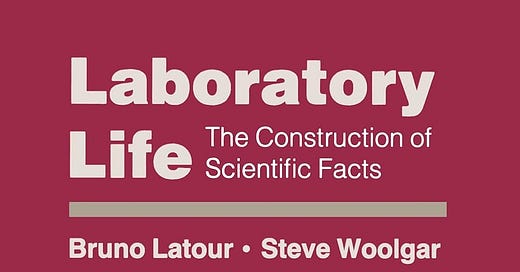The P2P Reading List (2025 May)
Read the best books first, otherwise you will find you do not have time.—Henry David Thoreau
The 48 Laws of Power by Robert Greene
Robert Greene is a master storyteller. I loved his book on mastery, but was circling around this one, due to its controversial topic: I am not interested in misusing power tactics. What convinced me was the author's intention to equip his readers with the tools to notice and to avoid falling prey to such dirty tricks. All this is told via stories from the most infamous and power-hungry leaders', tricksters', and courtiers' lives.
Draft No. 4 by John McPhee
I am always looking for ways to hone my writing. John McPhee is a revered journalist (whom I did not know before), and as his Draft No. 4 details his writing philosophy. It is half a biography, though.
Laboratory Life: The Construction of Scientific Facts by Bruno Latour
This gem from the 1970s takes an almost absurd approach to figure out how science is done. A philosopher and anthropologist[Probably this is the reason why the prose is overly (and unnecessarily) complicated with jargon] "goes for a field trip" into the Salk Institute, and studies scientists like a curious species-akin to how anthropologists used to spend time with hunter-gatherer tribes.
Still, the book is a godsend as it describes, as objectively as possible, how science moves forward, what makes the construction of new facts possible.
This is a must-read, especially if you are a (would-be) scientist. This book gives you the language to label the steps in the process explicitly, as opposed to (how the author demonstrates, is the case with scientists) leaving them tacit.
The Captain Class by Sam Walker
What makes a great team? It's a clichéd question. This doesn't make it less important, though. Sports journalist Sam Walker dissects the success of the best teams in sports and finally (and perhaps somewhat reluctantly) arrives at the conclusion (after ruling out many others) that the team captain makes the team great. But it is not an overly charismatic, aggressive, pep-talk ideal of a leader, but the one who mostly fits the image of a servant leader. Someone who might not be the most proficient, but someone who shows up, does the necessary (and even menial) work, tests the limits of the possible, and is always there for the team.
Yes! 50 Scientifically Proven Ways to Be Persuasive by Noah Goldstein
In the tradition of Getting to Yes, this book provides bite-sized findings from research on how to be more persuasive. For the content, I think it could have been a bit shorter, although if you focus only on the takeaways, it is an informative and quick read.
The Explorer's Gene by Alex Hutchinson
This book was a fun and instructive one, tackling the age-old dilemma of exploitation (stick to the known) versus exploration (go into uncharted territory). Alex Hutchinson also provides insights about what drives human exploration despite its danger and lack of tangible benefits.
Small Things Like These by Claire Keegan
A moving, Christmas-time fiction story about the Magdalene laundries in Ireland, which I did not even know existed.
The recommendation for the last two books came from The Growth Equation Academy. If you like the topics I write about, you might benefit from checking it out.
If you are interested in all the books that piqued my interest, you can also visit my Goodreads profile.



